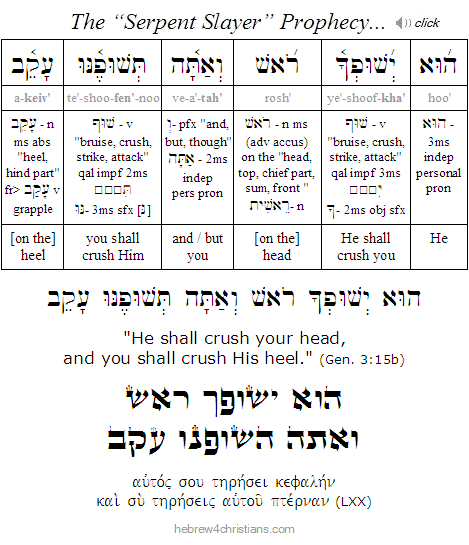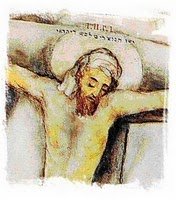|
As we prepare our hearts for the Passover, recall that the Hebrew verb "pasach" (פָּסַח) can mean not only "to pass over," but also "to limp," suggesting the heel of Messiah that was "bruised" in the battle for our salvation (Gen. 3:15). As it is written, "Just as Moses lifted up the serpent in the wilderness, so must the Son of Man be lifted up, that whoever believes in him may have eternal life. For God so loved the world, that he gave his only Son, that whoever believes in him should not perish but have eternal life (חַיֵּי עוֹלָם). For God did not send his Son into the world to condemn the world, but in order that the world might be saved through him" (John 3:14-17). Humanity as a whole has been "bitten by the snake" and needs to be delivered from its deadly venom. Just as the image made in the likeness of the destroying snake was lifted up for Israel's healing, so the One made in the likeness of sinful flesh was to be lifted up as the Healer of the world (Rom. 8:3). All we need to do is look up and believe...
Some people might object that the verb pasach (פָּסַח) alludes to the wounded Savior, our great Passover "Lamb who was slain" (John 1:29; 1 Pet. 1:19-20; Rev. 5:12; 13:8); however, it is evident that the Hebrew root can mean "to limp" as a result of a wound. Indeed the Hebrew participle pise'ach (פִּסֵחַ) means "lame" or "crippled" (for example, see Lev. 21:18; Deut. 15:21; 2 Sam. 9:13, etc.). Furthermore, there are several uses of the verb pasach that explicitly mean to "limp" or "be lame." For example, in 2 Sam. 4:4 it says: "and he (Mephibosheth) fell and 'became lame" (וַיִּפָּסֵחַ); in 1 Kings 18:21, we read: "how long will you limp (פּסְחִים) between two opinions?" and in 1 Kings 18:26 it is written: "and they (the priests of Baal) 'limped upon the altar" (וַיְפַסְּחוּ עַל־הַמִּזְבֵּחַ) in a pagan ritual dance. In other words there is clearly a connection between Passover and becoming wounded, and this alludes to the Suffering Servant, the Messiah, whose heel was bruised in the battle for our deliverance (Gen. 3:15). Those who wish to argue that pasach cannot refer to the "limping" of the Messiah, the Passover "Lamb of God" who was slain for our sins in the battle against the serpent, therefore have the burden to explain the meaning and usage of the verb pasach in these other verses of the Hebrew Scriptures.
Hebrew Lesson
The First Prophecy of the Torah:
 |
Note: The life is in the blood (Lev. 17:11). There is no Passover without the Lamb (Exod. 12:21) -- the wounded Lamb of God (Rev. 5:21)! Chag Pesach Sameach, chaverim!
|


